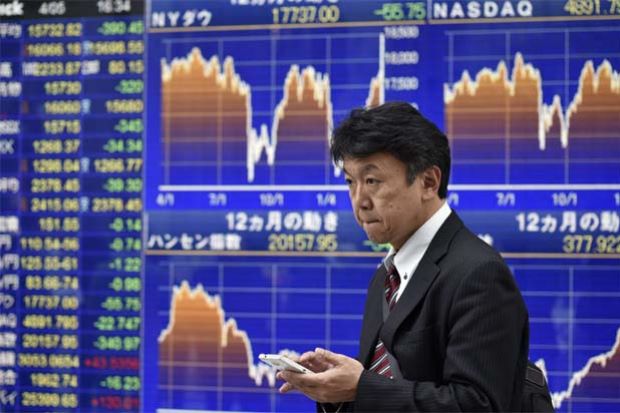Tokyo: U.S. stock futures and Asian shares slid on Thursday, hit by soft U.S. economic data, a relatively hawkish Fed and a media report that U.S. President Donald Trump is being investigated by a special counsel for possible obstruction of justice.
S&P mini futures dipped 0.3 percent. MSCI’s broadest index of Asia-Pacific shares outside Japan dropped 0.7 percent while Japan’s Nikkei fell 0.4 percent.
The Federal Reserve raised interest rates as expected on Wednesday and gave a first clear outline on its plan to reduce its $4.2-trillion portfolio of bonds.
Fed Chair Janet Yellen said the process could start “relatively soon”, while projections of Federal Reserve Board members also showed they expect one more rate hike by the end of year.
A majority of Wall Street’s top banks now expect the Fed to start reducing re-investment in bonds in September, compared to their previous median forecast of such a move in December.
Yet the Fed’s decision and confidence in continued U.S. economic growth was over-shadowed by surprisingly weak data released earlier in the day.
“The tone of the statement came across as relatively hawkish, despite the disappointing readings on core inflation, which the Fed contributed partly to transitory factors,” Anna Stupnytska, global economist at Fidelity International, said in a note.
Consumer prices unexpectedly fell on month in May and the annual increase in core CPI slipped to 1.7 percent, the smallest rise since May 2015, after advancing 1.9 percent in April.
Investors’ inflation expectations gauged by the spread between the 10-year inflation-linked bonds and conventional bonds fell to 1.726 percent, completely wiping out its rise since the U.S. presidential election.
Retail sales fell 0.3 percent last month — the largest fall since January 2016 and way below economists’ expectations for a 0.1 percent gain — amid declining purchases of motor vehicles and discretionary spending.
Risk sentiment was also hit by fear of more U.S. political turmoil after Washington Post reported that Trump is being investigated by special counsel Robert Mueller for possible obstruction of justice.
Mueller is investigating alleged Russian interference in the 2016 U.S. presidential election and possible collusion with the Trump campaign. Trump’s legal team denounced the report.
The news came just after the No. 3 Republican in the House of Representatives, Steve Scalise, was shot by a gunman angry with Trump and other Republicans. Scalise was listed in critical condition.
The weak U.S. data had knocked the dollar and U.S. bond yields to its lowest level in seven months against a basket of currencies.
The dollar index was little changed on Thursday after having slid to as low as 96.323 on Wednesday, having shed nearly 6 percent on the year, before bouncing back a tad on the Fed’s policy tightening.
The euro traded at $1.1220, after having hit a seven-month high of $1.1296. The dollar fetched 109.54 yen, not far from Wednesday’s eight-week low of 108.81 yen.
The 10-year U.S. Treasuries yield had slipped to as low as 2.103 percent and last stood at 2.134 percent.
“You cannot help the impression that there is a gap between the Fed’s bullish inflation forecast and the weakness in actual data,” said Daisuke Uno, chief strategist at Sumitomo Mitsui Bank.
“The Fed seems to think the weakness is temporary. But that view will be tested in coming months,” he added.
Money market instruments such as Fed fund futures show market players see the likelihood of one more rate hike this year as less than 50 percent.
Following the Fed’s rate hike, China’s central bank left interest rates for open market operations unchanged on Thursday, unlike in March when it lifted short-term interest rates in what economists said was a bid to stave off capital outflows and further depreciation pressure on the yuan.
Analysts had been split on whether China would follow the Fed again, noting the yuan is in much better shape than a few months ago after authorities’ recent moves to flush out depreciation bets against the currency.
The yuan held stable in early trade, trading at 6.7854 per dollar in the offshore trade.
Crude oil prices were listless after having slumped nearly 4 percent to their lowest close in seven months on Wednesday, on an unexpected large build in gasoline inventories.
Brent crude futures slipped another 0.4 percent in early Asian trade to $46.83 per barrel, near a five-month low of $46.64 touched in early May.
Many other commodity prices are also under pressure. Thomson CRB index tumbled to 14-month lows, having fallen almost 12 percent from this year’s high hit in January.




